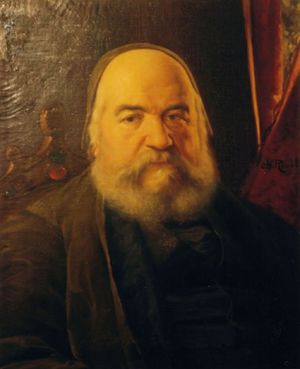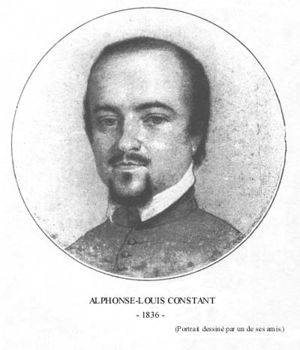Éliphas Lévi
Éliphas Lévi, also Éliphas Lévi Zahed was the pseudonym under which from 1854 on the catholic cleric Alphonse-Louis Constant (February 8, 1810, Paris - May 31, 1875, ibid.) wrote and published scriptures of occult and magical contents. Lévi is said to have been the re-founder of occultism in the 19th century.
Life
Per aspera ...
Alphonse-Louis's father was a shoemaker living in what is today the 6th Arrondissement in Paris, on the left bank of the Seine. The family's material conditions were very limited, but the parson at the church of Saint-André-des-Arts was running a school free of charge for the poor, at which Alphonse-Louis too would receive basic education. After that, and several intermediary steps later, last of which the seminary of Saint-Sulpice, in 1835 he became ordained sub-deacon, and from then on he was himself entrusted with teaching appointments. With one of his schoolgirls (whom in his confusion he took for a reincarnation of Virgin Mary) he fell in immortal love, and left the seminary for her just before he was to be ordained priest. But alas, she ran out on him.
In her disappointment at his quitting the education a few weeks later his mother took her own life. For Alphonse there commenced a time of aimless searching. Within one year he made the acquaintance of Honoré de Balzac, developed his gifts of visual arts by collaborating on the chorus line "Les Belles Femmes de Paris", made friends with the militant socialist Flora Tristan, and yet at the same time he carried on dreaming of a future as a priest. This dream guided his way to St. Peter's Abbey, a Benedictine monastery whose library of 20,000 volumes gave him the chance of making himself acquainted with scriptures from the early Christianity, by ancient gnostics, and by religious mystics as well. It was here that he authored a first booklet of his own entitled "Le Rosier de Mai" which was as pious as romantic, and rhapsodized about matters of love in so romantic and vivid a way that it was deemed better to expell him from the monastery.

